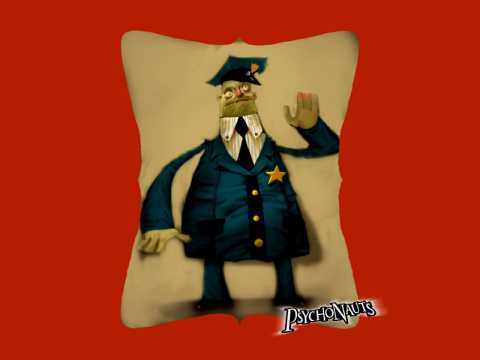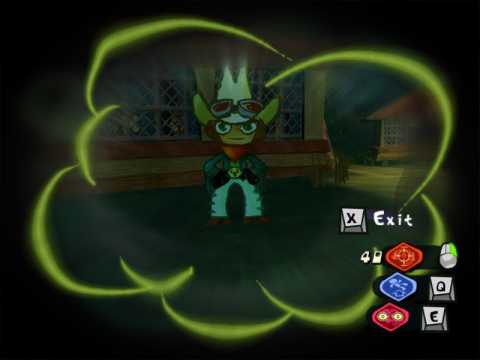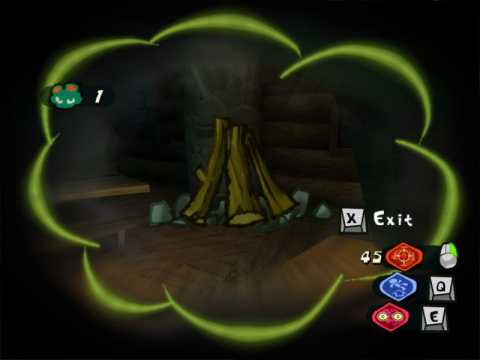Beauty is in the Mind of the Beholder: Perspective in Psychonauts
By thatpinguino 6 Comments
The first-person perspective is how all human beings with the power of sight view the world. We see the world through our own eyes, and then combine the images we see with our other senses and with our memories to create an image of the world around us. This perspective seems entirely natural to us and, as such, in games the game world is often displayed from this perspective. It is so often the case that we view game worlds from this perspective that we are rarely think about the fact that this is a perspective, rather than an absolute authoritative view on the world around us. Although, ostensibly you are viewing the world through the eyes of a character and seeing what they see, we rarely are made to question how much the character through whose eyes we see affects what we see and how we view the world in a game. The camera perspective is often simply that, the view of the game’s camera. However, the game Psychonauts takes the first person viewpoint and uses it to make a statement on the subjectivity of the human perspective. You see in Psychonauts there is only one case when the game is forcibly displayed through a first person perspective, when the main character, Raz, uses the power of clairvoyance to see through the eyes of others. Clairvoyance allows the player to see how different the world can look depending on the perspective of the person looking. Psychonauts shows the player not only that the perspectives of others vary from person to person, but also that personal experience and memory can shape one’s perspective to the point where two people can look at the same thing, yet see something both philosophically and literally different.

The power of clairvoyance is acquired about half way through Psychonauts in the mind of Boyd Cooper, a paranoid conspiracy theorist who is completely unable to communicate his worldview to Raz through any ordinary means. His worldview is so fundamentally shaped by the conspiracy theories he has woven in his own mind that there is no way for Raz to even begin understanding his thought process. It is at this point that Raz learns to use clairvoyance and in one instant all of the formerly unintelligible scribbling that Boyd had scrawled across his mind transform into a legible web of associations. When looking through Boyd’s eyes the player is allowed to see that although his conspiracy theories clearly have no basis in reality, to him there is a thread of logic that runs through it that makes perfect sense. Furthermore, as the player continues to explore Boyd’s mind it becomes clear that he was not always this shambling ball of cover-ups and lactose; rather, he was once an ordinary security guard working an ordinary job at a mall until one day he was fired and reacted to his unemployment… poorly. Thus, the player is made to see both how Boyd views the world as well as what lead him to see the world through such a distorted prism. As a result, Boyd is humanized and turned from a raving lunatic into a somewhat sympathetic tragic figure, and this is all thanks to the player’s ability to see the world literally from Boyd’s perspective. He is transformed from a caricature into a character.
Raz’s power of clairvoyance can also allow the player to see how Raz is viewed by the characters around him. When clairvoyance is used on an npc the camera shifts to the first person viewpoint of that npc. From their eyes Raz can see whatever they are looking at, as they see it. As a result, the player is allowed to see how Raz is viewed by both allies and enemies alike. It turns out that very few characters view Raz as merely Raz, instead each of them put their own filter on him and see him through that filter. Although most characters in the game have a unique perspective on Raz, I think that there are two major categories that these viewpoints fall into: people who view Raz through their own personal filter and people who filter Raz out completely.

The first group is made up of many of the campers and councilors; they view Raz as Raz, but they color him with aspects of their own personality. For example, J.T. is a camper who acts like a cowboy and as such when the player sees through J.T.’s eyes Raz is dressed as a cowboy. Another example is Psychonaut and camp counselor Sasha Nein; he sees Raz as a young version of himself complete with trench coat and stylish hair. The degree to which each character’s perspective alters Raz’s appearance is different, but their minds all change Raz to add similarities where there were none and remove differences. These characters show the way we as human beings often seek out the similarities between ourselves and others; we tend to see a little bit of ourselves in our friends and ignore some of the differences. The game makes it clear that this is not something isolated to a few people; every character in the game does this in some way to Raz. Each of the characters who color Raz with their own perspectives change his outfit in some way to match their own styles or perspectives.

The second group of characters is made up of people whose obsessions and complexes completely dominate their perspectives, and as a result they do not even see Raz as a human being; instead he is seen as some sort of extension of their own issues or desires. One example is Phoebe: when looking through Phoebe’s eyes, Raz looks like a pile of tinder. This is because Phoebe has a hard time controlling her power of pyrokineses, and as such she is constantly tempted to light things on fire with her mind. Though Raz is Phoebe’s friend, and someone who she interacts with on a regular basis, her own struggles to control her powers color her perspective so strongly that she perceives even a friend as something to burn. Every character in the game who suffers from some form of obsession views Raz in similar terms. By placing the player literally behind the eyes of each of these characters, the developers allow the player to see how an obsession can change the way a person views the world around them. These characters cannot see beyond themselves and they largely cannot function properly in ordinary society. This is evidenced by the fact that the majority of the characters who do not view Raz as a human being are either patients at the insane asylum, animals, or one of Ford Cruller’s personae. These characters have such a warped perspective that they cannot even control their complexes enough to function in society. They show what effects single mindedness and obsession can have on a human being.
Games use many tools to convey meaning, be it cut-scenes or dialog or lighting, but so rarely is something as simple and fundamental as camera perspective utilized to convey meaning as much as it is in Psychonauts. Psychonauts is a game in which the even things as routine as camera angles are used not just for character development, but to show that as human beings we have to be conscious of the perspectives of others. It is not enough to know yourself and the way you act, in order to have a complete understanding of the world and people around oneself, one must be as conscious as possible about the way other people’s experiences color their perspective. To ignore the differences and feelings of others is to view them as something other than human, to view them as an object, and, as the game shows, ignoring the wants and needs of others not only hurts other people, but also one’s own ability to function within society.
